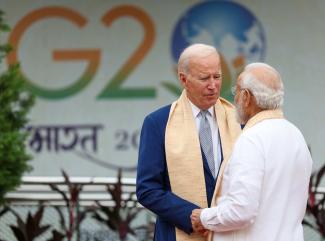United States
Democracy in danger in the United States
 picture-alliance/Newscom/Press Information Bureau
Indian Prime Minister Narendra Modi and US President Joe Biden on the sidelines of the G20 summit in New Delhi in September.
picture-alliance/Newscom/Press Information Bureau
Indian Prime Minister Narendra Modi and US President Joe Biden on the sidelines of the G20 summit in New Delhi in September.
Since his campaign against then-President Donald Trump, Joe Biden has frequently spoken of “the battle between democracy and autocracy” that he claims is taking place around the globe. In a speech on foreign policy in 2019, he accused Trump of failing to uphold basic democratic principles, thereby jeopardising the United States’ standing in the world. Instead of being driven by “chest-thumping” and “Twitter tantrums,” Biden says, US foreign policy should aim to “defend and advance our security, prosperity and democratic values.”
The difficulty is that security, prosperity and democratic values often come into conflict. The US has a long history of prioritising its national security and economic interests over democratic concerns. During the Cold War, the US allied with autocrats such as Ferdinand Marcos of the Philippines and François Duvalier of Haiti to limit the spread of communism and the influence of the Soviet Union.
Compromise and containment
Nowadays, the US is making similar compromises to contain China. Indian prime minister Narendra Modi has persecuted his opponents and brought the country closer to one-party rule. His administration has eroded the independence of the judiciary and endangered the human rights of non-Hindu minorities. Nevertheless, President Biden welcomed Prime Minister Modi to the White House in June 2023. The two countries struck numerous business deals despite protests from demonstrators and some US lawmakers. The Biden administration views India as a bulwark against China, both militarily and economically.
The US has also proven willing to work with Saudi Arabia. Early in his administration, Biden called for an end to arm sales to Saudi Arabia given the country’s human-rights abuses in the war in Yemen. Arms sales have continued, however; as recently as September 2023, the US State Department approved a sale worth $ 500 million according to the Defense Security Cooperation Agency.
The Biden administration has repeatedly shown that it considers Saudi Arabia too strategically important to sever ties over moral principles. Oil production in Saudi Arabia impacts petrol prices in the US, and high petrol prices could damage Biden’s chances of re-election in 2024. US officials have also recently pushed to normalise relations between Saudi Arabia and Israel, partly as a way to limit China’s influence in the region. It remains to be seen, however, whether Biden’s willingness to set aside democratic values will bear fruit – oil prices remain high, and Saudi–Israeli relations have been damaged by the current war with Hamas.
The Biden administration, like its predecessors, has also worked with, for example, Israel, Egypt, Turkey, Poland, the Philippines and the United Arab Emirates – countries whose democratic track records are spotty at best and non-existent at worst. Thus, Biden’s rhetoric belies the pragmatism that has always driven the US’s foreign policy approach. Whether Biden is guilty of oversimplification or hypocrisy, he would do well to treat allies and adversaries more consistently and not call out abuses in some places while ignoring them in others. The situation is complicated, however, by the US’s own democratic backsliding. According to the Liberal Democracy Index of Varieties of Democracy, the producer of the largest global dataset on democracy, the US has undergone substantial autocratisation in the past 10 years. The structural deficits of US democracy are being exacerbated by political polarisation and attempts by one of the two major parties to stay in power by any means necessary.
Democracy in the United States
Despite the way it positions itself abroad, the US government has always been somewhat ambivalent about democracy. There are numerous impediments to majority rule. For example, when the country was founded in the 18th century, government leaders worried that people would not be well enough informed to elect candidates for national office directly. When US Americans vote for president, they are actually voting for electors. Electors in each state cast their votes based on the winner of the popular vote. Most states have a winner-takes-all approach: if a candidate wins the popular vote in Florida, for instance, he or she wins all 30 of Florida’s electoral votes. The upshot of the winner-takes-all approach is that people who vote for the losing candidate essentially have their votes nullified. Furthermore, it is entirely possible for a candidate to win the nationwide popular vote but fail to gain enough electoral votes to win the presidency. The reverse is also true: both George W. Bush in 2000 and Donald Trump in 2016 lost the popular vote but nevertheless became president.
Citizens’ votes also do not count equally in the Senate, the upper chamber of the US legislature. Each state is allocated two senators, meaning that states with small populations have a disproportionate influence compared to states with large populations. For example, each senator from the state of Wyoming represents about 290,000 people. By contrast, each senator from the state of California represents about 20 million people. Yet their votes are equal in the Senate. In recent years, citizens of more populous states have voted for Democrats, the US’s left-wing party. Voters in less populous states have favoured Republicans, the right-wing party. Since there are more states with small populations, it has become easier for Republicans to represent a minority of Americans while still holding a majority in the Senate.
Republican insurrection
The structural advantage of Republicans in the Senate is especially important because the party is attempting to undermine democracy in a variety of ways. In the Senate, the minority party can use a tactic called the filibuster to delay voting on contentious legislation. Overcoming a filibuster requires securing 60 out of 100 Senate votes – a steep hurdle in today’s polarised political climate. In the past, Republican senators have used the filibuster to block anti-lynching laws and civil-rights legislation. More recently, they blocked a voting rights bill that would have restored some of the voting protections that Republican-led states have dismantled. Critics contend that Republican lawmakers want to make voting more difficult for Black and Latino voters, who tend to vote for Democrats. Republicans’ voter base tends to be white, and thus Republicans’ outsized influence in the Senate also means that the interests of white voters are overrepresented.
Republican lawmakers were particularly eager to restrict voting following the 2020 presidential election. Former President Donald Trump lost both the electoral and the popular vote to Joe Biden, yet instead of accepting the results, right-wing groups and some Republican lawmakers alleged that they were the result of widespread voter fraud. The issue came to a head on 6 January 2021, when Trump supporters stormed the US Capitol to stop lawmakers from counting states’ electoral votes. Five people were killed and 140 wounded in the most violent attack on the building since the British burned it down in the War of 1812. No evidence of voter fraud has been found, and Trump has been indicted on criminal charges for his repeated attempts to overturn the legal outcome of the 2020 election. However, it took the legal system a very long time to indict Trump, even though it was obvious that crimes had been perpetrated. The implication is that it may prove impossible to sentence Trump before the next election.
It is difficult to predict the future of democracy in the US. On the one hand, US Americans can take comfort in the fact that voter fraud is largely a fiction. On the other hand, confidence in election integrity has been eroded. Republicans seem increasingly inclined to challenge the validity of any election they lose. Trump has already attempted one coup. Barring a lengthy prison sentence, there is no reason why he could not attempt another.
Nevertheless, Biden cannot afford to alienate the entire Republican Party, just as he cannot afford to ignore countries that fall short of his democratic ideals. The Republican Party has evolved from an anti-slavery party in the 19th century to a champion of big business and small government in the 20th to an instrument of Donald Trump’s chaos in the 21st. Not all Republican officials or voters are happy about Trump’s influence, though. And while Biden has signalled his willingness to reach out to such people, the Democratic Party in general has done little to address the frustrations that propelled Trump to power in the first place. Countering the threat to American democracy will require both parties to acknowledge their failures, a process that would surely also boost the US’s credibility abroad.
Claire Davis is a freelance translator who has worked for D+C/E+Z since 2013. Currently she is also an instructor of German at Truman State University in Missouri, USA.
clairemdavis1983@gmail.com


